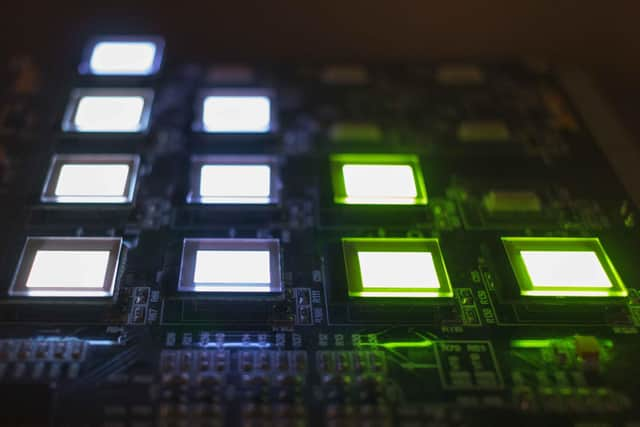Funding boost for St Andrews spin-out behind greener screen tech
SolOLED, which was only formed last year, has secured £200,000 in new funding from Scottish Enterprise and has initiated a collaborative research project with Censis - Scotland’s innovation centre for sensing, imaging, and “internet of things” (IoT) technologies - to commercialise its novel materials as components in organic light-emitting diodes (OLEDs).
Like traditional LEDs, OLEDs produce light when an electric current passes through them, the colour of which is linked to the nature of the emitter material used.
Advertisement
Hide AdAdvertisement
Hide AdHowever, current green and red OLEDs employ emitters that contain the scarce, environmentally impactful, and costly noble metal iridium.
Displays utilising OLEDs are rapidly replacing traditional LED and liquid-crystal display (LCD) technologies in the likes of smartwatches, mobile phones and monitors. They are also expected to be key components in more flexible, large area, and interactive technologies, such as VR headsets and transparent touch screens.
Eli Zysman-Colman, chief executive of SolOLED, said: “The market for solution-processed OLEDs is growing apace and will need new and improved performance materials to feed its supply chains.
“We believe we are the first company to be dedicated to developing sustainable materials that can replace the scarce, noble metals presently used in solution-processed OLEDs. While they have different physical properties, the materials have similar performance characteristics, but with the added benefit of being much cheaper and more sustainable than the compounds that contain iridium.
“The next step is to commercialise these materials and the project with Censis and funding from Scottish Enterprise will help in this endeavour.”


Jane Martin, managing director of innovation and investment at Scottish Enterprise, said: “The development of SolOLED’s novel materials has the potential to address the main barrier to the widespread adoption of OLED technology - cost - as well as creating a truly sustainable alternative to traditional LEDs.
“By commercialising its materials with support from Scottish Enterprise and Censis, SolOLED can seize the opportunity presented by this growing market and cement Scotland’s reputation as a leading centre of academically-driven entrepreneurship, while aiding global efforts to address the net zero challenge.”
Comments
Want to join the conversation? Please or to comment on this article.